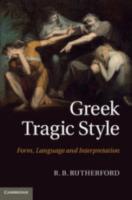
CUP (2012) p/b 471pp £22.99 (ISBN 9781107470750)
No better book on Greek tragedy has been published in the 21st century than this one. R.’s project is highly ambitious. Always giving chapter and verse, he discusses what the characters and the choruses say or sing and how they say or sing it. Vocabulary, imagery, rhetoric, irony and characterization are all grist to his mill. And in a brilliant final chapter, he investigates the alchemy through which Aeschylus, Sophocles and Euripides transform generalizing statements into great poetry. R.’s ambitions are triumphantly realized.
His discussions of excerpts from the plays are consistently judicious and insightful as well as thought-provoking. I found myself almost always nodding in assent and then frequently stimulated to build on his perceptions. For example, to his illuminating discussion of the agôn in Hippolytus, one might add that Theseus and his son are eventually granted the stichomythia that they are denied there in their loving exchange at the end of the tragedy. And to his comment on the fact that Hermes disappears from the action after the prologue of Ion, one could append the question of why he then takes cover in a nearby clump of bay trees to check out how the play will unfold.
Following in the footsteps of Caroline Spurgeon, whose Shakespeare’s Imagery and What it Tells Us (1935) I think he underrates, he writes admirably of strings of imagery, which he finds particularly prominent in the Oresteia, and illustrates the way in which the language and terms used in the prologues can prove thematic, especially in Sophocles. His extrapolation from the words of the plays to throw light on character again and again hits the nail on the head. The Helen of Orestes, for example, is a ‘benign but shallow, tactless personality’. R. brings illumination to every aspect of his subject.
This may be a somewhat formidable volume to press upon a sixth former, though (s)he could with considerable advantage be directed to certain passages. For undergraduates, for scholars and for all adults who love Greek tragedy, it is simply indispensable.
James Morwood—Wadham College, Oxford
